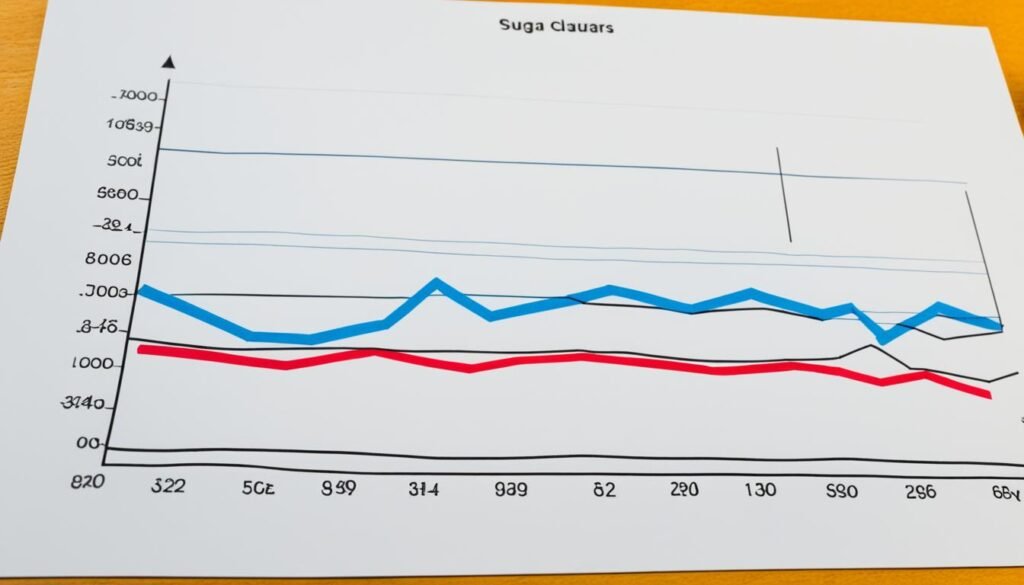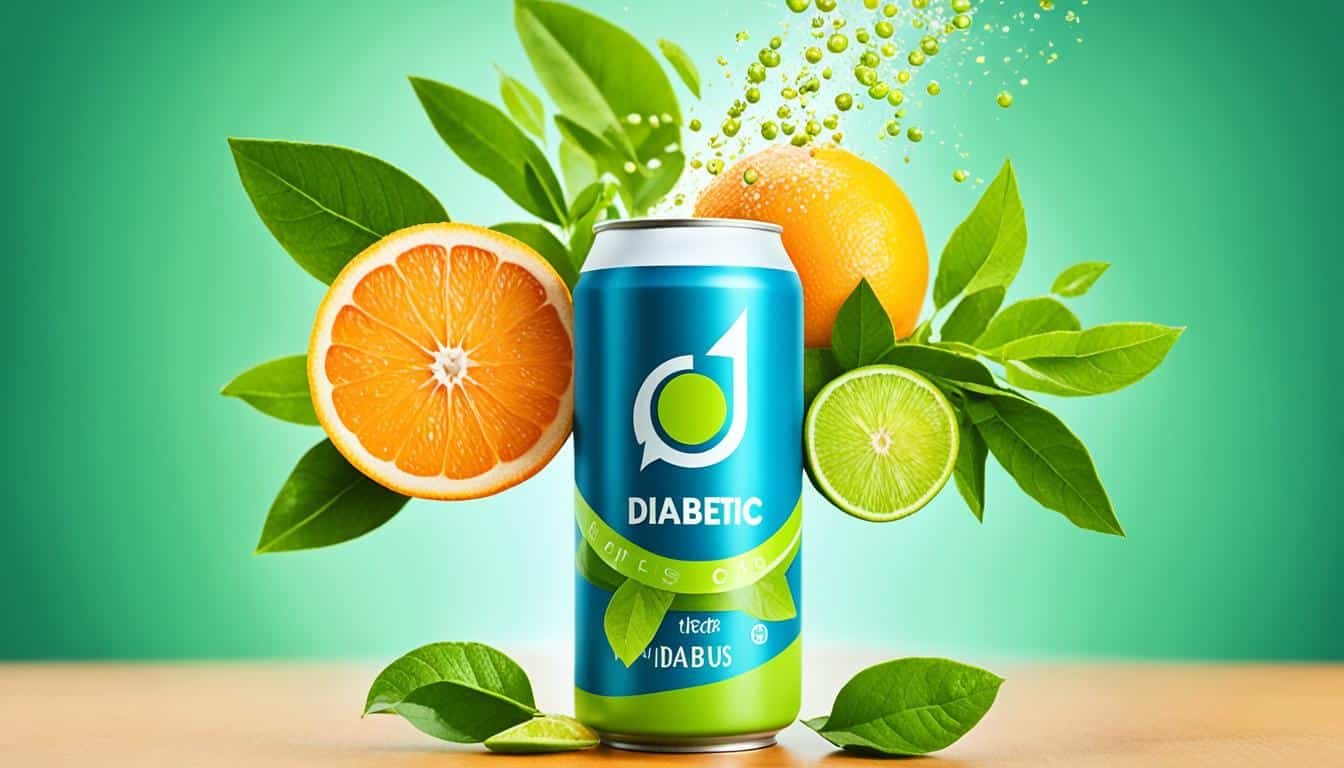For individuals with diabetes, finding safe and effective ways to boost energy levels is crucial. While energy drinks can provide a quick solution, it is important to choose drinks that won’t compromise blood sugar levels or overall health. This guide will explore the best energy drinks for diabetics, considering factors such as caffeine content, sugar levels, and potential health risks. By making informed choices, individuals with diabetes can enjoy the benefits of energy drinks while managing their condition effectively.
Key Takeaways:
- Energy drinks can be consumed by diabetics, but it’s vital to choose safe options.
- Read labels carefully to determine the caffeine and sugar content of energy drinks.
- Sugar-free or low-sugar energy drinks are better choices for individuals with diabetes.
- Natural energy drinks made with healthier ingredients are also suitable options.
- Consult with healthcare professionals to ensure energy drink consumption aligns with personalized diabetes management plans.
What Are Energy Drinks?
Energy drinks are popular beverages that are widely marketed for their ability to increase alertness and boost energy levels. These drinks typically contain high levels of caffeine, along with varying amounts of sugar or artificial sweeteners. For individuals with diabetes, understanding the impact of caffeine and sugar on blood sugar levels is crucial in making informed choices about consuming energy drinks.
Caffeine, a central nervous system stimulant found in energy drinks, can provide a temporary energy boost and increased mental alertness. However, it can also have a stimulating effect on blood sugar levels, potentially causing fluctuations in glucose levels in individuals with diabetes. Additionally, the high sugar content in many energy drinks can further predispose diabetics to blood sugar spikes.
It’s essential for individuals with diabetes to carefully evaluate the ingredients and potential health risks associated with energy drinks. By doing so, they can make informed decisions that align with their dietary needs and support their overall health and wellness.
“Understanding the ingredients and potential health risks associated with energy drinks is essential for making informed choices.”
To give you a better understanding of the caffeine and sugar content commonly found in energy drinks, here is a table detailing some popular brands:
| Energy Drink Brand | Caffeine Content (per 8 oz) | Sugar Content (per 8 oz) |
|---|---|---|
| Red Bull | 80 mg | 27 g |
| Monster Energy | 80 mg | 54 g |
| Rockstar Energy Drink | 160 mg | 62 g |
While these values can vary based on the serving size and specific product, it’s important to note the significant caffeine and sugar content in these popular energy drinks. For individuals with diabetes, consuming such drinks without moderation and careful consideration can have adverse effects on blood sugar control and overall health.
In the next section, we will explore the effects of energy drinks on blood sugar levels, providing further insight into why conscientious consumption is essential for diabetics.
The Effects of Energy Drinks on Blood Sugar Levels
Energy drinks can have varying effects on blood sugar levels, depending on their caffeine and sugar content. For individuals with diabetes, understanding these effects is crucial for managing their condition effectively.
Consuming energy drinks that are high in sugar can lead to weight gain and an increased risk of developing type 2 diabetes. The excessive intake of sugar can cause spikes in blood sugar levels, which can be detrimental for individuals with diabetes. It is important to note that these high-sugar energy drinks often contain large amounts of caffeine as well, which can further affect blood sugar levels.
Caffeine, a common ingredient in energy drinks, has the potential to impact insulin sensitivity and elevate blood sugar levels. This means that for individuals with diabetes, consuming energy drinks with high caffeine content can disrupt blood sugar control and lead to unstable glucose levels.
To minimize potential risks, individuals with diabetes should prioritize monitoring their blood sugar levels and opt for energy drinks with lower sugar and caffeine content. Choosing energy drinks that are specifically formulated to be sugar-free or low-sugar can be a safer option. Additionally, considering natural energy drinks that rely on healthier ingredients can also be beneficial.
By making informed choices and being mindful of the sugar and caffeine content in energy drinks, individuals with diabetes can better manage their blood sugar levels and reduce the potential negative effects on their health.

Impact of Sugar and Caffeine Content in Energy Drinks on Blood Sugar Levels
To provide a clearer understanding of the effects of energy drinks on blood sugar levels, let’s examine the sugar and caffeine content of some popular energy drink brands:
| Energy Drink Brand | Sugar Content per Serving | Caffeine Content per Serving |
|---|---|---|
| Brand A | 25g | 200mg |
| Brand B | 35g | 150mg |
| Brand C | 10g | 80mg |
| Brand D | 5g | 120mg |
As seen in the table above, energy drinks can vary significantly in terms of their sugar and caffeine content. Brand A and Brand B have higher sugar content, which can lead to greater fluctuations in blood sugar levels. Brand C and Brand D, on the other hand, have lower sugar content, making them a more suitable choice for individuals with diabetes.
It’s important to note that while Brand A has the highest caffeine content, it may not be the most appropriate option for individuals with diabetes due to its high sugar content. Brand D, with lower sugar and moderate caffeine content, may be a better alternative. The choice ultimately depends on an individual’s specific dietary needs, health considerations, and preferences.
“Choosing energy drinks with lower sugar and caffeine content can help individuals with diabetes manage their blood sugar levels more effectively and minimize potential risks.”
Recommended Energy Drinks for Diabetics
While energy drinks are not generally recommended for individuals with diabetes, there are options available that can be consumed safely. Diabetics should prioritize drinks that are sugar-free or have lower sugar content to avoid blood sugar spikes. Additionally, natural energy drinks made with healthier ingredients can be a suitable alternative. When choosing energy drinks, it is essential to read labels carefully and select beverages that align with dietary needs and preferences.
Benefits of Sugar-Free Energy Drinks
Sugar-free energy drinks offer a viable option for diabetics who want to enjoy a quick boost of energy without the negative impact on blood sugar levels. These drinks are formulated without added sugars, and instead, they often use artificial sweeteners or natural sweeteners like stevia. By opting for sugar-free options, diabetics can satisfy their energy needs while maintaining stable blood sugar levels.
Low-Sugar Energy Drinks
For individuals with diabetes who prefer some sweetness in their energy drinks, low-sugar options are available. These drinks contain a reduced amount of sugar compared to regular energy drinks, minimizing the potential impact on blood sugar levels. It is important to note that low-sugar energy drinks still need to be consumed in moderation and monitored alongside overall dietary intake.
Natural Energy Drinks
Natural energy drinks offer an alternative for diabetics who prioritize consuming beverages made with healthier ingredients. These drinks are often formulated using natural flavors, extracts, and sweeteners, providing a more wholesome option. Diabetics can look for energy drinks that are free from artificial colors, preservatives, and high-fructose corn syrup. Natural energy drinks can provide a refreshing and energizing experience without compromising blood sugar control.
When choosing energy drinks for diabetics, it is important to consider personal dietary needs, taste preferences, and any specific health concerns. Reading labels and understanding the ingredients in energy drinks can help individuals make informed choices that align with their diabetes management plans.

| Energy Drink Brand | Sugar Content (per serving) | Caffeine Content (per serving) | Key Features |
|---|---|---|---|
| Brand A | 0g | 100mg | – Sugar-free – Natural ingredients – Added vitamins and minerals |
| Brand B | 3g | 80mg | – Low-sugar – No artificial sweeteners – Organic ingredients |
| Brand C | 5g | 50mg | – Reduced sugar – Enhanced with antioxidants – No artificial colors or flavors |
Potential Health Risks of Energy Drinks for Diabetics
Energy drinks can provide a quick boost of energy when needed, but for individuals with diabetes, there are potential health risks to consider. It is essential to be aware of these risks and prioritize overall health and well-being.
Increased Blood Pressure and Cardiovascular Disease
Energy drinks that are high in sugar and caffeine can lead to increased blood pressure in individuals with diabetes. Excessive consumption of these drinks can further elevate the risk of developing cardiovascular disease. Maintaining stable blood pressure levels is crucial for diabetics to manage their condition effectively and reduce the chances of complications.
Weight Gain
High-sugar energy drinks can contribute to weight gain, which is a concern for individuals with diabetes. Excess weight can make it more challenging to control blood glucose levels and increase the risk of developing complications associated with diabetes.
Interaction with Diabetes Medications
Some energy drinks may interact negatively with medications that individuals with diabetes are taking to manage their condition. It is essential to consult with a healthcare professional before incorporating energy drinks into the routine to ensure there are no adverse interactions that could affect diabetes management.
Being informed about the potential health risks associated with energy drinks for diabetics is crucial to making responsible choices. Consulting with a healthcare professional and prioritizing overall health and wellness can help individuals with diabetes navigate the challenges posed by energy drinks and make informed decisions that align with their diabetes management plans.

Tips for Safe Energy Drink Consumption
Individuals with diabetes can still enjoy energy drinks responsibly by following some guidelines. It is important to monitor blood glucose levels before and after consuming an energy drink to assess its impact. Choosing drinks with lower sugar and caffeine content, and opting for natural or sugar-free versions when possible, can help minimize risks. It is also advisable to consult with a healthcare professional to ensure that energy drink consumption aligns with individual diabetes management plans.

Monitor your blood glucose levels
Prior to consuming an energy drink, it is crucial for individuals with diabetes to check their blood glucose levels to establish a baseline. Monitoring blood glucose levels after consuming the energy drink will help evaluate its impact on blood sugar levels. This practice enables individuals to make informed decisions regarding their energy drink consumption and adjust their diabetes management plan accordingly.
Choose drinks with lower sugar and caffeine content
When selecting energy drinks, it is essential for individuals with diabetes to opt for drinks with lower sugar and caffeine content. High sugar levels in energy drinks can cause blood sugar spikes and contribute to poor diabetes control. Choosing beverages with reduced sugar content or sugar-free versions can help mitigate the risk of impacting blood glucose levels. Additionally, opting for drinks with lower caffeine content can minimize the potential for caffeine-induced blood sugar fluctuations.
Consult with a healthcare professional
It is strongly recommended for individuals with diabetes to consult with a healthcare professional before incorporating energy drinks into their routine. Healthcare professionals can provide personalized guidance and advice tailored to individual circumstances. They can assess the compatibility of energy drink consumption with existing diabetes management plans, taking into account factors such as medications, blood glucose control, and overall health status.
Also Read:- Energize Your Day: Homemade Energy Drinks For A Healthy Kick
By following these tips for safe energy drink consumption, individuals with diabetes can strike a balance between enjoying energy-boosting beverages and maintaining optimal diabetes care. Prioritizing blood glucose management and seeking professional advice contribute to informed decision-making and overall well-being for individuals with diabetes.
Alternative Ways to Boost Energy for Diabetics
While energy drinks can provide a quick energy boost, individuals with diabetes have alternative options to increase their energy levels safely. By adopting healthy lifestyle habits, diabetics can boost their energy and improve overall well-being.
Maintain a Balanced Diet
Eating a balanced diet is essential for managing energy levels. Diabetics should focus on consuming nutrient-rich foods that provide sustained energy without causing spikes in blood sugar levels. Incorporate whole grains, lean proteins, fruits, and vegetables into meals and snacks to maintain a steady release of energy throughout the day.
Get Regular Exercise
Regular physical activity is a great way to boost energy levels for individuals with diabetes. Engaging in exercises such as walking, cycling, swimming, or yoga can help increase blood circulation, improve stamina, and enhance overall energy levels. Aim for at least 30 minutes of moderate-intensity exercise most days of the week, following guidelines provided by healthcare professionals.
Manage Stress Levels
Stress can deplete energy levels and negatively impact overall health. Diabetics should prioritize stress management techniques such as deep breathing exercises, meditation, yoga, or engaging in hobbies to reduce stress levels. Adequate stress management can help maintain optimal energy levels throughout the day.
Ensure Sufficient Sleep
Adequate sleep is crucial for energy restoration and overall well-being. Diabetics should aim for 7-8 hours of quality sleep each night. Establishing a consistent sleep routine, creating a sleep-friendly environment, and avoiding sleep disruptors like caffeine and electronic devices before bedtime can promote better sleep quality and enhance energy levels during the day.
By adopting these alternative ways to boost energy, diabetics can optimize their energy levels safely and effectively. These lifestyle factors, combined with proper diabetes management and regular communication with healthcare professionals, contribute to a balanced and energized life.

The Importance of Diabetes Management
Managing diabetes is crucial for overall health and well-being. Effective diabetes management involves various components, such as monitoring blood glucose levels, proper medication management, and implementing lifestyle changes to support stable blood sugar levels. By incorporating these strategies into daily life, individuals with diabetes can significantly improve their health outcomes and reduce the risk of complications.
Regular Monitoring of Blood Glucose Levels
Regularly monitoring blood glucose levels is a fundamental aspect of diabetes management. This involves measuring blood sugar levels using a glucose meter or continuous glucose monitoring system. By keeping track of blood glucose levels throughout the day, individuals with diabetes can understand how different factors, such as food, physical activity, and medication, affect their blood sugar. This information allows for better decision-making in terms of insulin dosage, meal planning, and overall diabetes management.
Proper Medication Management
Proper medication management is essential for individuals with diabetes. This includes taking prescribed medications, such as insulin, as instructed by healthcare professionals. Insulin is a hormone that helps regulate blood sugar levels and is commonly used in diabetes management. It is crucial to follow the recommended dosage and administration schedule to ensure optimal control of blood glucose levels. Regular communication with healthcare professionals is necessary to monitor the effectiveness of medications and make necessary adjustments.
Lifestyle Changes for Stable Blood Sugar Levels
Implementing lifestyle changes can greatly contribute to stable blood sugar levels and overall diabetes management. This includes following a balanced and nutritious diet, engaging in regular physical activity, managing stress levels, and getting sufficient sleep. A well-planned diet and regular exercise help maintain a healthy weight, enhance insulin sensitivity, and promote overall well-being. Stress management techniques, such as meditation or relaxation exercises, can help reduce stress hormone levels, which can impact blood sugar levels. Adequate sleep is also crucial for hormonal balance and optimal glucose metabolism.
By incorporating these lifestyle changes, individuals with diabetes can potentially reduce the reliance on medication, improve blood glucose control, and enhance overall quality of life.
Collaboration with Healthcare Professionals
Collaborating with healthcare professionals is key in diabetes management. Healthcare providers, such as doctors, diabetes educators, and registered dietitians, can provide valuable guidance and support in developing personalized diabetes management strategies. They can offer education on self-care practices, review and adjust medication regimens, and provide ongoing monitoring of blood glucose levels. Regular check-ups and communication with healthcare professionals allow for proactive management of diabetes and ensure that any potential concerns or complications are addressed promptly.
By working together with healthcare professionals, individuals with diabetes can receive the necessary tools and support to effectively manage their condition and minimize the risk of long-term complications.
Ultimately, diabetes management goes beyond the consumption of energy drinks. It involves a comprehensive approach that empowers individuals with diabetes to take control of their health and make informed choices in their daily lives. By prioritizing regular monitoring of blood glucose levels, proper medication management, implementing lifestyle changes, and collaborating with healthcare professionals, individuals with diabetes can successfully manage their condition and lead healthy, fulfilling lives.
Conclusion
When it comes to energy drinks for diabetics, making safe choices is crucial for maintaining blood sugar levels and overall health. Opting for sugar-free or low-sugar energy drinks can help diabetics enjoy a quick boost of energy without compromising their well-being. By carefully monitoring blood glucose levels and incorporating alternative ways to boost energy, individuals with diabetes can maintain a balanced and healthy lifestyle.
Managing diabetes goes beyond energy drink consumption. It requires regular monitoring of blood glucose levels, proper medication management, and lifestyle changes that support stable blood sugar levels. Prioritizing diabetes management and seeking personalized guidance from healthcare professionals is essential for long-term health and well-being.
Remember, energy drinks can provide a temporary energy boost, but diabetics should approach them with caution. By choosing safe options, monitoring blood glucose levels, and following a comprehensive diabetes management plan, individuals with diabetes can lead fulfilling lives while effectively managing their condition.
FAQs
Q: Can people with diabetes drink energy drinks?
A: People with diabetes should be cautious when consuming energy drinks, as they can contain high amounts of sugar and caffeine which may affect blood sugar levels.
Q: What are the best drinks for people with diabetes?
A: The best drinks for people with diabetes are those that are sugar-free and low in caffeine content, such as water, herbal teas, and sugar-free energy drinks that are specifically designed for individuals with diabetes.
Q: Do energy drinks raise blood sugar levels?
A: Yes, energy drinks containing high amounts of sugar or artificial sweeteners can raise blood sugar levels, which can be particularly concerning for individuals with diabetes.
Q: Are there energy drinks specifically formulated for people with diabetes?
A: Yes, there are energy drinks available that are specifically formulated with artificial sweeteners and low sugar content, designed to be safer for individuals with diabetes to consume.
Q: What is the effect of caffeine in energy drinks on blood sugar levels?
A: Caffeine in energy drinks can potentially affect blood sugar levels, especially in individuals with diabetes or insulin resistance, and may cause fluctuations in blood sugar levels.
Q: How do energy drinks with artificial sweeteners affect blood sugar levels?
A: Energy drinks with artificial sweeteners may still have the potential to affect blood sugar levels, and individuals with diabetes should carefully monitor their response to these sweeteners.
Q: What are the safest options for people with diabetes who want to consume energy drinks?
A: The safest options for people with diabetes who want to consume energy drinks are those that are sugar-free, low in caffeine, and specifically designed for individuals with diabetes, in consultation with their healthcare provider.





